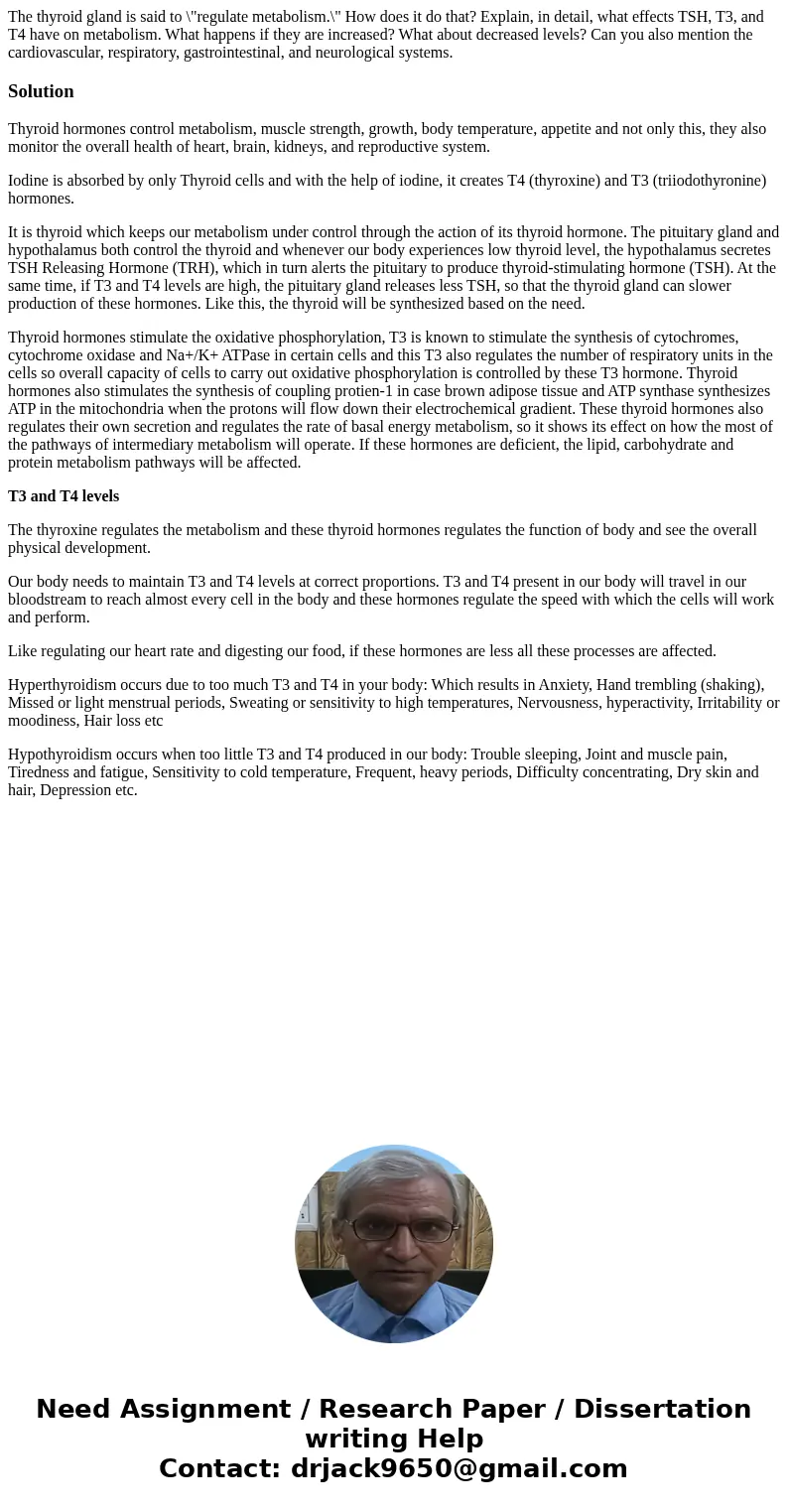The thyroid gland is said to regulate metabolism How does it
The thyroid gland is said to \"regulate metabolism.\" How does it do that? Explain, in detail, what effects TSH, T3, and T4 have on metabolism. What happens if they are increased? What about decreased levels? Can you also mention the cardiovascular, respiratory, gastrointestinal, and neurological systems.
Solution
Thyroid hormones control metabolism, muscle strength, growth, body temperature, appetite and not only this, they also monitor the overall health of heart, brain, kidneys, and reproductive system.
Iodine is absorbed by only Thyroid cells and with the help of iodine, it creates T4 (thyroxine) and T3 (triiodothyronine) hormones.
It is thyroid which keeps our metabolism under control through the action of its thyroid hormone. The pituitary gland and hypothalamus both control the thyroid and whenever our body experiences low thyroid level, the hypothalamus secretes TSH Releasing Hormone (TRH), which in turn alerts the pituitary to produce thyroid-stimulating hormone (TSH). At the same time, if T3 and T4 levels are high, the pituitary gland releases less TSH, so that the thyroid gland can slower production of these hormones. Like this, the thyroid will be synthesized based on the need.
Thyroid hormones stimulate the oxidative phosphorylation, T3 is known to stimulate the synthesis of cytochromes, cytochrome oxidase and Na+/K+ ATPase in certain cells and this T3 also regulates the number of respiratory units in the cells so overall capacity of cells to carry out oxidative phosphorylation is controlled by these T3 hormone. Thyroid hormones also stimulates the synthesis of coupling protien-1 in case brown adipose tissue and ATP synthase synthesizes ATP in the mitochondria when the protons will flow down their electrochemical gradient. These thyroid hormones also regulates their own secretion and regulates the rate of basal energy metabolism, so it shows its effect on how the most of the pathways of intermediary metabolism will operate. If these hormones are deficient, the lipid, carbohydrate and protein metabolism pathways will be affected.
T3 and T4 levels
The thyroxine regulates the metabolism and these thyroid hormones regulates the function of body and see the overall physical development.
Our body needs to maintain T3 and T4 levels at correct proportions. T3 and T4 present in our body will travel in our bloodstream to reach almost every cell in the body and these hormones regulate the speed with which the cells will work and perform.
Like regulating our heart rate and digesting our food, if these hormones are less all these processes are affected.
Hyperthyroidism occurs due to too much T3 and T4 in your body: Which results in Anxiety, Hand trembling (shaking), Missed or light menstrual periods, Sweating or sensitivity to high temperatures, Nervousness, hyperactivity, Irritability or moodiness, Hair loss etc
Hypothyroidism occurs when too little T3 and T4 produced in our body: Trouble sleeping, Joint and muscle pain, Tiredness and fatigue, Sensitivity to cold temperature, Frequent, heavy periods, Difficulty concentrating, Dry skin and hair, Depression etc.

 Homework Sourse
Homework Sourse